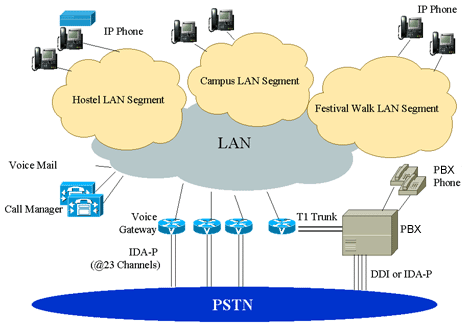IP Phone Goes to Work
The current telephone service on campus is provided by a Public Branch Exchange (PBX) system and supported by the Facilities Management Office (FMO). Though the PBX offers reliable telephone services, yet most of the manufacturers see it soon becoming an obsolete technology and thus have ceased further development on it. They are now concentrating their effort on developing Voice over IP (VoIP) technologies, and IP Phone is just one of the VoIP products that can integrate voice, data as well as video on the same handset. IP Phone not only allows voice, data and video to share the same network cable (hence reducing cabling and support cost) but also offers many features normally not found or cannot be implemented under the conventional PBX system. Unlike PBX technology, the infrastructure of the VoIP technologies is pretty much like an ordinary data networking equipment. Consequently, the maintenance and support cost of an IP phone system are significantly lower than that of a conventional PBX system.
When IP phone first entered the market a few years ago, its reliability and voice quality were indeed questionable and many users found them far from satisfactory when compared to the conventional PBX. However, our recent pilot run has confirmed that the IP technology is now mature and reliable enough for a campus-wide implementation. The Computing Services Centre (CSC) therefore recommends that the existing PBX system be gradually phased out and that the IP phone technologies be adopted in all new buildings and offices.
Advantages of an IP Phone System
So what are the advantages of using an IP phone system? The answers are as follows:
-
Provides an open and standard based IP solution
-
More scalable than PBX
-
Offers mobility. The same IP phone can be plugged in any network point on the campus network and still retain its phone number without any reconfiguration on the IP phone system.
-
Easy to develop applications that utilize data from existing database residing on the data network and then either output to the screen on the IP phones or read the output through the speaker of the handset. For example, your IP phone can read not only the voice mail but also your email or the reminder of an overdue payment.
-
Extensive readily available applications such as Personal Assistance, Call Center and Unified Messaging can be accessed through IP phones.
-
Voice, data, and video are converged in the same network and hence saving cabling and support costs.
-
Easy administration for both administrators and end users
-
Low cost for maintenance
-
Initial cost is on a par with PBX
Recommended Approach for Implementation
It is recommended that the VoIP technologies be implemented in three stages:
-
Stage I
To replace all 300 telephones in Festival Walk (FW) currently subscribed to PCCW's Citinet services with IP phones.
-
Stage II
To provide IP phones for all phases of the Student Hostel and the first lot will be implemented in July 2002 when Phase I is completed. When the fibre link between the main campus and Phase II of the Student Hostel becomes ready in year 2003, the Student Hostel IP Phone system can then be easily integrated with the campus's phone services.
-
Stage III
When the fibre link between the FW and main campus becomes ready in July 2002, the IP Phone system at FW will be able to integrate with the campus PBX system easily and seamlessly through a gateway using a T1 link. From then on, new IP phones would be provided in the main campus when new lines are required, offices are relocated, or upon request by departments. It is expected that the entire PBX system be gradually phased out within 3 years.
An overall picture of the IP phone project can be illustrated below:

Proposed Management and Support of the IP Phone System
As the telephone network will eventually merge with the data network, it has been decided that the telephone services should therefore be supported by the CSC starting from July 1 2002. It is expected that the VoIP system can be supported without the need of additional manpower.